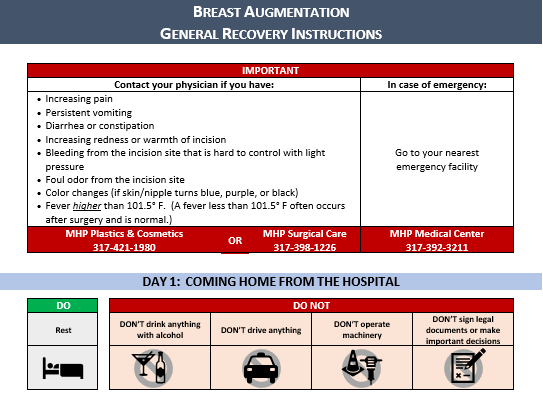
Medications:
- You can take all your medicines that you were taking before your procedure.
- Also take the new medications you were given after your procedure. Be sure to follow the instructions for how to take your medicines. These instructions usually include what time of the day to take your medicines and whether to take them during a meal or on an empty stomach.
- For Pain: It is OK to take Tylenol (acetaminophen) or Advil (Ibuprofen) for mild pain. If this is not enough, you may take your prescribed pain medicine as directed. DO NOT take Tylenol (acetaminophen) at the same time as taking your prescription pain medicine.
- For Constipation: Prescription pain medicines frequently cause constipation. This means it can be hard to use the restroom. You may take over-the-counter stool softeners to help prevent this problem.
- For Birth Control: Certain birth control products work by changing body chemicals called hormones. Some examples include Birth Control Pills, Skin Patches, Implants, and certain IUDs. The medicines you may have received while in the hospital can stop those birth control products from working. To avoid getting pregnant, use an additional birth control product that does not affect your hormones. Some examples include condoms and spermicides. Use these additional products for the next 31 days if you wish to avoid becoming pregnant.
- Pradaxa: If you have been prescribed Pradaxa, begin taking the evening of surgery.
Eating and Drinking:
- Resume usual diet as tolerated. Start with liquids first. If you aren’t nauseated, you may advance your diet. No alcoholic beverages today.
What to Expect During this Time:
- It is normal to have a slightly sore throat for a few days following your procedure. This should go away within 24-48 hours. You may use a throat lozenge or cough drop for temporary relief.
- Having surgery may cause temporary body aches, tiredness, nausea, and light-headedness. These should also go away within 24-48 hours after surgery.
- For your procedure, an IV was inserted into your arm or another part of your body. It is normal to see bruising where the IV was placed. If you have swelling or discomfort, a cold compress may be helpful. If you develop redness, warmth, or oozing where the IV was placed, please contact your physician.

What to Expect During this Time:
- Avoid heavy lifting for the first 2 weeks after surgery and until cleared by Dr. Cristea. Gentle activities around house are fine, as tolerated. Gentle range of motion of the arms is encouraged.
- Showering is ok immediately after surgery and encouraged to keep wounds clean. This should be done with all dressing off (except the donor dressing) and with any drains supported (this is somewhat tricky and may require help from family). After your shower, replace the dressing with dry gauze.
- Avoid ointments/Bacitracin.
- You will be required to wear a surgical bra for 6 weeks post-surgery.
- Keep dry gauze in bra for padding. Keep surgical bra on most of the time, but take off to shower. Bra should be snug, but not tight. If bra feels too tight, please call Dr. Cristea.
- Breast augmentation surgery stretches the breast tissue, which may be painful, especially when the procedure involves inserting implants under the chest muscle. In most cases, the highest level of pain is experienced 48 hours after surgery. Pain levels typically decrease each day.
- Most pain can be controlled with pain medications. Some pain medications can cause nausea. If you do experience nausea, call the office so that anti-nausea medication may be prescribed.
- Breast may feel tight and sensitive to the touch. Skin may be warm and/or itchy. You may also have trouble in raising your arms.
- Initially some discoloration may occur but should disappear quickly. Swelling may also occur and should usually resolve with a month.
- Surgical glue will be used on the outside of your and will dissolve on its own in a week or two. Do not apply ointments to wounds.
- You should refrain from lifting, pulling, pushing, running, exercising, or anything that causes pain for 6-week post-surgery.
- Implants can be “high riding” immediately after surgery, and this is usually normal. Wearing your surgical bra will help provide support as they descend to their expected position.
- You may be able to return to work within a few days to a week after surgery, depending on the nature of your job. Please discuss this with Dr. Cristea before returning to work.
- Follow up appointment is located in your surgery folder.
- Your doctor's office will also notify you of any test results from your procedure.
- A nurse will call you in the next few days to discuss your recovery and answer any questions you may have. If your have questions before our nurse calls please contact your physician or call MHP Surgical Care (317-398-1226) to speak with one of our nurses. After hours, you may call the MHP Medical Center (317-392-3211).